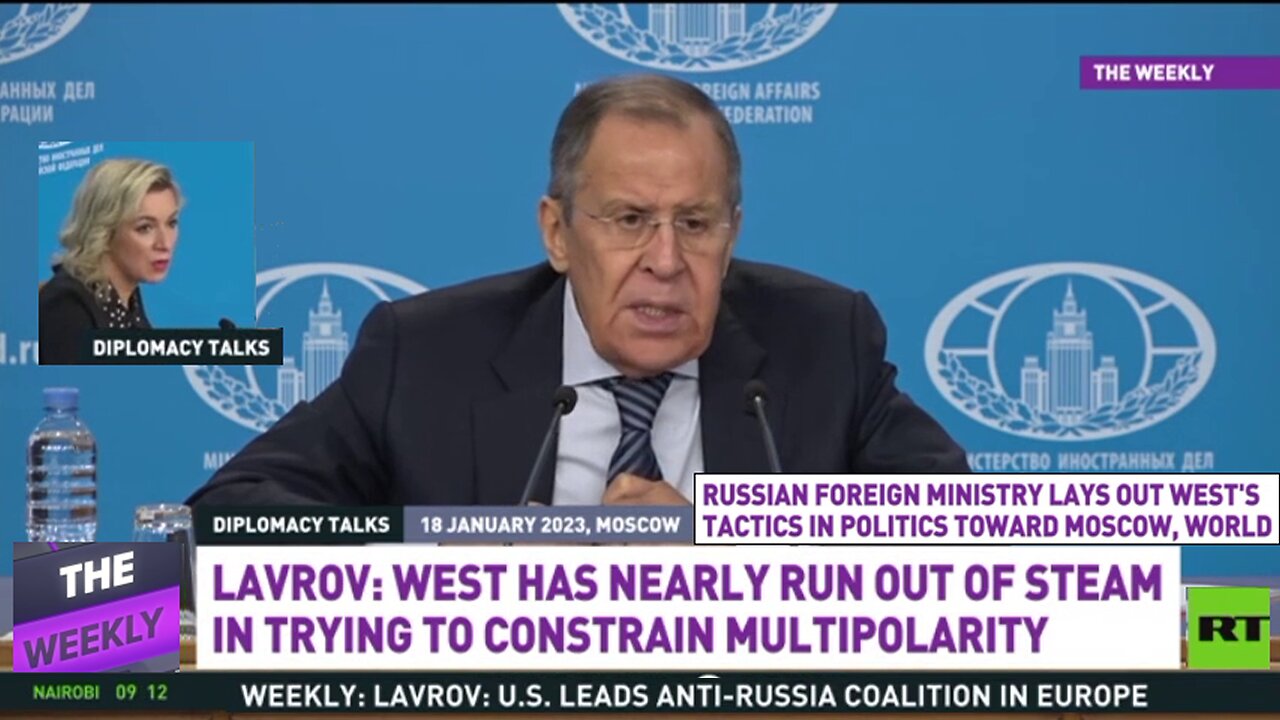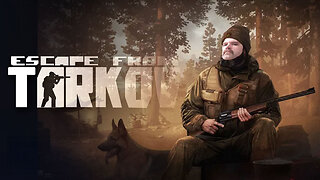Premium Only Content

RT News - January 22nd 2023 - The Weekly
Continued shelling in Donetsk civilian only regions has left nine people dead and more injured.
-
RT's correspondent Murad Gazdiev follows the Russian paramilitary group Wagner as they advance further along the Donbass front lines, with the strategically important town of Soledar having recently come under Russian control.
-
Russia's foreign minister Sergei Lavrov says the US has established an anti-Moscow coalition within Europe and is using Ukraine to wage a proxy war against Russia. Remarks were made during a two hour + press conference (QS I will try and up the video when I can find it, link to English translated transcript here https://mid.ru/en/press_service/video/view/1848395/ this is the link to part two, courtesy of VK https://vk.com/video/@rt_international?z=video-154921046_456250707%2Fclub154921046%2Fpl_-154921046_-2)
-
South Africa seeks alternatives to using the US dollar in international trade, as it turns to the BRICS group of countries for a better option.
-
Protests in Burkina Faso continue as citizens protest the French presence. "France has never helped us, they are terrorists" Citizens talk to Ouezen Louis-Oulon about why they continue to protest.
-
The Indian government criticizes a new BBC documentary about Prime Minister Narendra Modi, saying the piece promotes a colonial mindset.
-
==================================================
Below via RT website 1) Ex-Zelensky aide casts doubt on Ukraine’s military fortunes
2) --- Moscow explains Ukraine grain shipment delays
2a) --- Türkiye outlines ‘complications’ in potential Ukraine-Russia talks
3) --- Red Cross chief visits Russian Defense Ministry
3a) --- Russian soldiers detail brutal torture by Kiev’s forces
4) --- RT France to close after accounts frozen
5) --- EU car sales collapse – industry body
6) --- Twitter Files revealed growing government control – Matt Taibbi **RT exclusive**
7) --- Germany’s energy crunch explained
F) --- A Taiwan bloodbath might suit US decision-makers just fine **OP-ED**
==================================================
22 Jan, 2023 07:35
1) Ex-Zelensky aide casts doubt on Ukraine’s military fortunes
There is no guarantee that Kiev will be able to defeat Moscow’s forces, Aleksey Arestovich has said ( QS - also see https://twitter.com/Glenn_Diesen/status/1616873849928171521 )
Ukraine has squandered the opportunity to prevail in the conflict with Russia, Aleksey Arestovich, a former adviser to President Vladimir Zelensky, said on Friday.
Speaking in an interview with political analyst Yuri Romanenko, Arestovich said that “if everyone thinks that we are guaranteed to win the war, it seems very unlikely.”
“What do you think, the assessment of Polish President Andrzej Duda… that there is basically no certainty whether Ukraine will survive… Did he say that for no special reason, or did he say that based on some kind of information?” Arestovich asked.
Duda said several days ago that a “decisive moment” in the conflict could come in a few weeks or months. “And this moment is the answer to the question, if Ukraine will survive or not,” he explained, highlighting the need to support Kiev with Western-made weapons.
Arestovich also warned that Ukraine should not consider itself invincible. “We are invincible only until we are at each other’s throat. When this happens, we are pretty much vincible, in a short time and unexpectedly for ourselves.”
The former official stated that Ukraine had “missed not only a military opportunity, we lost time, and the Russians began mobilization, restored the front [line] situation, and even created superiority in some places.” He added that “not only the West did not give [Ukraine] weapons, we missed a public chance, in terms of domestic and state [policies].”
On Tuesday, Arestovich resigned from his post after stating that the Russian missile that fell on a residential block and killed dozens in the southeastern city of Dnepr was shot down by Ukrainian air defenses. Later, the former aide apologized for his remarks, describing them as “a serious mistake.”
On the day of the tragedy, Russia conducted a missile strike “on the military command and control system of Ukraine and associated energy facilities,” according to the Russian Defense Ministry. Commenting on the Dnepr incident, Kremlin Press Secretary Dmitry Peskov said that “the Russian Armed Forces do not target residential buildings or social infrastructure facilities. The attacks are only aimed at military targets.”
Moscow ramped up strikes against Kiev’s infrastructure in early October, citing repeated Ukrainian sabotage on Russian soil, including the deadly bombing of the strategic Crimean Bridge.
https://www.rt.com/russia/570281-ukraine-victory-no-guarantee/
==================================================
21 Jan, 2023 13:46
2) --- Moscow explains Ukraine grain shipment delays
Kiev’s merchants are creating an “artificial” backlog by breaking UN-brokered regulations, the Russian Foreign Ministry has said
Ukrainian businessmen are sabotaging the internationally brokered deal to unblock grain shipments from the country’s ports, the Russian Foreign Ministry said on Saturday. The agreement – the Black Sea Grain Initiative – was signed in July last year to restore deliveries of wheat and other agricultural products interrupted by the Ukraine conflict.
In a statement on Thursday, the UN said that more than 100 ships were in Turkish waters, including 32 vessels waiting for inspection by the Joint Coordination Centre (JCC), which is made up of representatives from Ukraine, Russia, Türkiye, and the UN.
“In the last two weeks, the average waiting time of vessels between application and inspection is 21 days,” the UN said, urging “all parties to work to remove obstacles for the reduction of the backlog and improve operational efficiencies within the JCC.”
The Russian Foreign Ministry stated that it could not confirm UN data about the number of ships and waiting times. According to Moscow, 64 vessels were docked at Ukrainian ports or waiting in inspection zones. “The order of inspections and passages is being managed by the Ukrainian side. Russian representatives cannot influence them in any way,” the statement read.
The ministry accused Ukraine of creating “an artificial backlog” of freighters in Istanbul. The problem was “caused by Ukrainian merchants who are contracting vessels not in accordance with the rules and terms of registration, and without participating in the initiative,” the ministry said.
“Those in Kiev are only driven by the profit motive, to sell as many and as fast as possible, while neglecting official procedures.”
Moscow insisted in the past that, while the grain deal was promoted as a way to deliver food to the poorest countries, the majority of the shipments were heading for the EU and Türkiye.
In late October, Russia briefly suspended its participation in the agreement after accusing Ukraine of sending drones to attack a naval base in Crimea. Moscow eventually returned to the deal, saying that it had received additional assurances from Kiev. Ukraine has neither confirmed nor denied involvement in the attack.
https://www.rt.com/russia/570266-russia-ukraine-grain-backlog/
===========RELATED
19 Jan, 2023 11:22
2a) --- Türkiye outlines ‘complications’ in potential Ukraine-Russia talks
Moscow and Kiev now have even more issues to resolve, Foreign Minister Mevlut Cavusoglu has said
The diplomatic process to settle the Ukraine conflict has become more complicated despite Moscow and Kiev having initially made headway, Türkiye’s Foreign Minister Mevlut Cavusoglu said on Thursday.
Speaking during his visit to Washington, DC, where he met with US Secretary of State Antony Blinken, Cavusoglu stated that while Ankara had been doing its best to put an end to hostilities, “it is not entirely in our hands to stop the war.”
The minister noted that, though Russia and Ukraine had covered “quite a distance in the beginning, and the parties came closer to at least a ceasefire,” later the situation “had evolved, unfortunately.”
Cavusoglu stated that the conditions of the Ukraine conflict “have changed.” “It has become more complex and has different dimensions. Unfortunately, many more different areas to negotiate have emerged,” he added.
The diplomat reiterated that Ankara continues its mediation efforts as part of the UN- and Türkiye-brokered grain deal, which aims to unlock agricultural exports via the Black Sea from Russia and Ukraine. He added that the same applies to prisoner swaps between Moscow and Kiev, as well as mitigating risks at the nuclear power plant in Russia’s Zaporozhye Region.
The US and Russia are also maintaining contacts in order to avoid the use of nuclear weapons, Cavusoglu noted. This was an apparent reference to talks between the head of the Russian Foreign Intelligence Service (SVR), Sergey Naryshkin and CIA Director William Burns, which took place in Ankara in mid-November and revolved around issues of nuclear security.
Türkiye has consistently tried to act as a mediator between Moscow and Kiev to settle the stand-off diplomatically. In March, the nation hosted talks between the two. While Moscow had initially voiced optimism about the peace process, the Ukrainian government quickly backtracked on all the promises it had made in Istanbul, with the sudden change of mood occurring shortly after then-UK prime minister Boris Johnson visited Kiev.
Since then, Ukrainian President Vladimir Zelensky signed a decree officially rejecting peace talks with his Russian counterpart Vladimir Putin. Later, he floated a ten-point “peace formula,” which requires Russia to withdraw all its troops from the territory Kiev claims as its own. Moscow has rejected Zelensky’s proposal, saying that it refuses to take reality into account and illustrates Kiev’s unwillingness to find a solution to the crisis.
Moscow has repeatedly said that it is open to talks with Kiev but only if Ukraine “recognizes the reality on the ground,” including the new status of the regions of Donetsk, Lugansk, Kherson, and Zaporozhye as parts of Russia.
https://www.rt.com/russia/570129-turkiye-complications-russia-ukraine-talks/
===============================================
20 Jan, 2023 23:19
3) --- Red Cross chief visits Russian Defense Ministry
Ukraine, Afghanistan, Syria, access to prisoners of war, and other humanitarian issues were on the agenda
International Committee of Red Cross (ICRC) President Mirjana Spoljaric met with the Russian deputy defense minister, Colonel General Aleksandr Fomin, in Moscow on Friday.
They reportedly discussed the Ukraine conflict and access to prisoners of war on both sides, as well as other humanitarian issues, including the situations in Syria, Afghanistan, and Ethiopia.
“We have been enjoying very close cooperation with the ICRC for many, many years,” General Fomin said as he welcomed Spoljaric at the Defense Ministry’s headquarters in Moscow.
The Russian military worked with the international humanitarian body during the operation in Syria, he noted, though now the situation in Ukraine “has taken a special priority” in their joint efforts.
Ministry officials held as many as 30 meetings with regional ICRC office representatives last year, according to Fomin. “We seek to continue this very important and necessary work together with you,” Fomin told Spoljaric, who recently took over as ICRC head.
The Swiss-born diplomat was on a two-day visit to Moscow, during which she also met with Foreign Minister Sergey Lavrov and human rights commissioner Tatyana Moskalkova.
“One of President Spoljaric’s priorities is that prisoners of war are treated humanely and receive regular ICRC visits,” the ICRC said in a statement regarding the trip. The organization has had access to POWs on both sides of the conflict, but there are still thousands it has not been able to visit, the statement said, adding that it seeks “full, unimpeded, and regular access to all prisoners of war, wherever they are held.”
“Constant confidential and bilateral engagement with parties to the international armed conflict” is essential for the international body’s work, the ICRC added.
Spoljaric’s visit to Moscow comes around one month after a similar trip to Kiev. Both sides have accused each other of violating the rights of POWs.
In early December, a group of Russian servicemen released as part of a prisoner exchange alleged that they had endured brutal torture at the hands of Kiev’s forces. According to the soldiers, their interrogators beat them with shovels and stabbed them with knives, leaving their wounds untreated.
https://www.rt.com/russia/570238-deputy-defense-minister-icrc-chief/
============RELATED
7 Dec, 2022 14:31
3a) --- Russian soldiers detail brutal torture by Kiev’s forces
Investigative Committee hears the accounts of servicemen who have recently been repatriated after captivity
Russian servicemen have alleged they endured brutal torture while being held captive by Kiev’s forces. The country's Investigative Committee announced on Wednesday that it will be launching a criminal investigation into the abuse claims.
According to testimony published on the armed service's official Telegram channel, Russian soldiers were subjected to merciless interrogations. One fighter alleged he was taken prisoner when he was already wounded, having had a bone in his right hand broken by a bullet. He claims that Ukrainian interrogators beat him with a shovel and with rebar, shot him in both feet, broke his jaw, several ribs and punctured his lungs.
Another soldier claimed his interrogation began with a knife stab to the leg, which caused severe bleeding that remained untreated. When his captors didn’t like his answers, they beat him with thumps and kicks, and then with a helmet or the with butt of a rifle, he alleged. After the interrogation ended, the soldier testified that he was held down by three men as a fourth cut off one of his fingers.
He also claims that he was forced to sign an agreement to cooperate with Ukrainian special services, under a threat of murder and harm to his loved ones.
The Investigative Committee has also stated that “the testimonies of Russian military personnel indicate that representatives of Ukraine are grossly violating the requirements of the Geneva Convention on the Treatment of Prisoners of War, which prohibit ill-treatment, torture and abuse.”
Investigators say they will continue to work with the Ministry of Internal Affairs, the Federal Security Service and Russia’s Defense Ministry to identify those responsible for the murder and torture of civilians and of captured Russian servicemen. The committee has vowed to record all evidence of brutal crimes committed by Kiev’s forces.
Оn Tuesday Moscow and Kiev conducted their latest prisoner exchange in the 60-60 format, where both sides released 60 captive soldiers who were considered to be in “mortal danger.” The released Russian servicemen have since been transported to Moscow to undergo treatment and rehabilitation, and to receive psychological and medical assistance.
https://www.rt.com/russia/567838-ukraine-torture-russian-pow/
===============================================
21 Jan, 2023 21:26
4) --- RT France to close after accounts frozen
The decision followed “five years of harassment” by the authorities, network head Xenia Fedorova said in a statement
RT’s French subsidiary will cease broadcasting after its accounts were frozen by the French treasury, its director, Xenia Fedorova, announced on Saturday. Paris claimed that it froze the funds in line with EU sanctions, which targeted RT’s parent company.
"After five years of harassment, the authorities in power have achieved their goal: the closure of RT France," Fedorova said in a statement shared on Twitter. Earlier this week, Fedorova said that she had received a letter from RT France’s bank indicating that the network’s funds had been frozen at the request of the French treasury, rendering it impossible for the outlet to pay its staff.
"Although RT France is not on the sanctions list and has the right to operate in France, such a decision practically paralyzes our activities,” she said at the time.
The French Finance Ministry told AFP that RT France’s assets had been frozen in compliance with the most recent EU sanctions package, and not on the government’s initiative.
The sanctions package – the ninth imposed on Moscow following the launch of Russia’s military operation in Ukraine last February – was announced by the EU last month. It blacklisted RT’s parent company, TV-Novosti, as well as a number of domestic Russian TV networks.
RT France had been forbidden from broadcasting in the EU since July, after the European Court of Justice upheld a ban imposed by EU authorities in March. However, it continued broadcasting online until its accounts were targeted. Kremlin spokesman Dmitry Peskov described the ban as “concerning and regrettable,” telling reporters that “the Europeans are stamping out the same ideals they’re imposing across the globe.”
A source within the Russian Foreign Ministry told the RIA Novosti and TASS news agencies on Saturday that Moscow would respond in kind to the treasury’s decision. “The blocking of RT France’s accounts will lead to retaliatory measures against French media in Russia,” the source said, adding: “The measures will be such that they will never forget them.”
RT has attracted controversy in the EU since before the conflict in Ukraine, with German regulators banning its German-language channel at the beginning of February 2022. Russia’s Foreign Ministry responded by withdrawing the press accreditation of German state broadcaster Deutsche Welle, and listing the network as a foreign agent.
https://www.rt.com/news/570273-rt-france-accounts-frozen/
===============================================
22 Jan, 2023 05:34
5) --- EU car sales collapse – industry body
The number of new vehicles registered in the region in 2022 plunged to the lowest in 30 years, the ACEA says
The European Union passenger car market contracted by 4.6% last year to just 9.3 million units, which is the region’s lowest level since 1993, the European Automobile Manufacturers Association (ACEA) reported this week.
According to the report, the slump was mainly due to the impact of component shortages in the first half of the year. The market, however, improved from August to December, with new car registrations expanding by 12.8% in the last month of the year.
Overall, in 2022 only Germany managed to post growth (+1.1%) among the EU’s four largest markets. It was helped by the strong result in December, the ACEA said. The other three markets all performed worse than in 2021, with Italy posting the steepest decline (-9.7%), followed by France (-7.8%) and Spain (-5.4%).
Data showed that the number of vehicles registered in EU countries (excluding Malta, for which statistics are not available) rose to more than 896,000 units last month from over 795,000 a year earlier.
Car sales by the Volkswagen Group (including Skoda, Audi, Seat, Porsche, and others) in the European Union decreased by 5.2% last year, the ACEA said. Automaker Stellantis saw its sales nosedive by 14.1%, while Renault Group sales fell by 4.3%, and BMW sales by 5.1%. Mercedes-Benz sales stood practically at the same level as in 2021, at 549,023 units.
Meanwhile, South Korean Hyundai (including Kia) increased its vehicle sales in the EU by 2.6%, Japanese Toyota and Honda sales grew by 7.7% and 4.4%, respectively. Sales by American carmaker Ford decreased by 2.3%.
https://www.rt.com/business/570060-eu-car-sales-collapse/
================================================
21 Jan, 2023 19:44
6) --- Twitter Files revealed growing government control – Matt Taibbi **RT exclusive**
US federal agencies' influence over the platform was growing as the 2020 election drew nearer, the investigative reporter has told RT
(QS I have asked RT to up the show to Rumble - sadly for now the only place we can view it is on the RT website, which most of us don't have access to without jumping thru' hoops due to censorship. If you have a VPN you can watch it here https://www.rt.com/shows/whistleblowers/570173-elon-musk-twitter-purchase/)
During his examination of the Twitter Files, investigative reporter Matt Taibbi discovered a pattern of increasing government control over the social media platform, he told RT’s John Kiriakou on Saturday’s episode of ‘The Whistleblowers’.
Since purchasing Twitter for $44 billion in October, Elon Musk has released batches of documents shedding light on the platform’s previously opaque censorship policies, enlisting independent journalists to break each document dump. Independent journalist Matt Taibbi was the first chosen, publishing communications that revealed a company-wide effort to suppress reporting on Hunter Biden’s laptop – the contents of which implicated the Biden family in numerous foreign corruption schemes.
“I wasn’t very interested in that story per se,” Taibbi told Kiriakou. “The question I was really interested in answering was what level of communication and coordination exists between…Twitter and federal law enforcement, and perhaps agencies beyond the FBI, Department of Homeland Security, or the White House.”
While researching Twitter’s decision to ban then-President Donald Trump’s account in early 2021, Taibbi said that he began noticing instant messages between Twitter executives “where you would see little indentations at the top of the messages that said ‘this is flagged by DHS, this is flagged by the FBI.’”
“And that right away told us something very significant, that Twitter was in the business of processing requests that came from federal law enforcement agencies,” he said.
Taibbi discovered that in the runup to the 2020 election, Twitter would receive lists of thousands of accounts to suspend. These lists were handed to the company by the FBI, CIA, NSA, Pentagon, State Department, Treasury and others, and sometimes came in the form of excel spreadsheets, which employees were expected to ban without question.
“There were so many requests, they got one batch one day and when they completed it there was a round of applause in the chat,” Taibbi told Kiriakou.
At one point, when Twitter employees received a list of accounts from the State Department to ban for spreading so-called Russian “disinformation,” they argued that they should take no action, as the department had provided no evidence. However, a Twitter executive who previously worked for the CIA told them to flag the accounts anyway, as the site’s “government partners are becoming more aggressive” with their censorship demands.
“That decision was significant, because it was one of the moments when Twitter basically realized ‘We can’t say no any more,’” Taibbi explained.
In the time since Taibbi released his first story on the Hunter Biden laptop, further reporting has revealed that Twitter assisted the US military’s online influence campaigns, censored “anti-Ukraine narratives” on behalf of multiple US intelligence agencies, suppressed “legitimate content” on Covid-19 on behalf of the White House, and participated in the “Russiagate” hoax.
https://www.rt.com/news/570272-twitter-files-matt-taibbi/
===============================================
21 Jan, 2023 22:25
7) --- Germany’s energy crunch explained ** RECAP**
Berlin continues to blame Moscow for the crisis, while Washington seeks to take advantage of the situation
Germany has been struggling to meet its energy needs for almost one year as it seeks to reduce its dependence on Russian gas. Officials in Berlin still blame the nation’s problems on Moscow and its supposed ‘energy war’ against the West.
On Friday, the energy transition minister of the northern German state of Schleswig-Holstein, Tobias Goldschmidt, accused Moscow of “starting an energy war” and “reducing gas supplies.” Federal Economy Minister Robert Habeck, who has repeatedly stated that ‘energy independence’ from Russia is worth all the trouble, called the massive energy imports from the country a “big mistake” at the World Economic Forum in Davos earlier this week.
1. Why did Russia reduce gas supplies to Germany?
In June 2022, Russian energy giant Gazprom reduced gas flows through the Nord Stream 1 – a major pipeline delivering natural gas to Germany under the Baltic Sea – first by 40% and later by 60%.
The decision was prompted by technical issues, as German company Siemens did not return a turbine for gas-pumping units at a Nord Stream 1 compressor station on time. Gazprom then said it had to further reduce the gas supplies to 20% of the total capacity over the summer, as four out of five turbines at the station required maintenance. Siemens could not provide the turbine due to the sanctions imposed on Russia by the US and EU, Gazprom stated.
Siemens accused Gazprom of lying, though admitted that only one of the five turbines needed for the gas flow was operational in August 2022.
2. What happened to the Nord Stream pipelines?
On September 26, the Nord Stream pipelines were damaged in a series of underwater explosions off the island of Bornholm, within the economic zones of Denmark and Sweden. Both strings of the Nord Stream 1 and one string of the Nord Stream 2 were rendered unusable by the blasts.
Sweden, Denmark, and Germany launched a probe into the incident but refused to share the results with Russia. Gazprom investigators were only allowed to inspect the blast site once in late October 2022. Moscow called the incident an “act of terrorism” and pointed the finger at Washington.
Western officials were quick to blame Russia for the incident. Later, the Washington Post admitted that there was no evidence implicating Moscow. No official investigation results were presented and no suspects were officially named.
3. Fate of the Nord Stream 2
Russia’s Nord Stream 2 pipeline was completed in September 2021. However, it remained stuck in the process of certification by Berlin and Brussels until February 2022. Germany repeatedly claimed that the project did not meet EU standards despite previously defending it.
The project also faced tremendous pressure from the US from the outset. Washington declared it a threat to Europe’s security and imposed sanctions on companies involved in construction.
The Nord Stream 2 also faced vehement opposition from Ukraine and Poland, which both serve as transit countries for Russia’s overland gas network. Kiev and Warsaw feared losing leverage with the emergence of an alternative transit route.
German Chancellor Olaf Scholz, who initially backed the project, indefinitely halted its certification after Russia recognized Ukraine’s Donbass republics as independent in February 2022.
4. What will Russia do now?
Moscow still considers Europe to be a viable market, Deputy Prime Minister Aleksandr Novak said in December 2022. The nation is also ready to resume gas supplies to Europe through the Yamal-Europe Pipeline, which is now used by Poland for reverse gas transit from Germany.
Russian gas is also still being supplied to certain European buyers via a transit line through Ukraine and the TurkStream pipeline through Türkiye.
5. What is happening in Germany?
German energy giants RWE and Uniper filed lawsuits against Gazprom, demanding compensation for the missing gas supplies. Gazprom said it does not recognize the violation of contracts in Uniper’s case.
Some German officials, including Saxony’s prime minister, Michael Kretschmer, have called for the Nord Stream pipelines to be restored. Germany must reserve the option to “buy something other than expensive liquefied natural gas after the war,” he said last week.
The opening of several LNG terminals in Germany has been met with protests over the past few weeks by locals and eco-activists who object to the lack of safety checks and environmental protection measures amid the sped-up approval process.
The US is still trying to take advantage of the situation in Germany as well as in other EU nations. In October, Washington called the Nord Stream explosion a “tremendous opportunity to become Europe’s largest LNG supplier.” French Finance Minister Bruno Le Maire blasted the US for selling LNG “at four times the price that it sets for its own industrialists.”
“The conflict in Ukraine must not end in American economic domination and a weakening of the EU,” he warned at the time.
https://www.rt.com/news/570274-germany-energy-crunch-russia/
==================================================
22 Jan, 2023 00:16
8) --- Whistleblowers expose scale of UK migrant child trafficking – Guardian
Dozens of young asylum seekers have allegedly been kidnapped from hotels run by the Home Office
The UK Home Office has turned a blind eye to the disappearance of dozens of unaccompanied migrant children from a Sussex hotel it operates as a children’s home, according to an investigation by The Guardian published on Saturday.
Of the 600 unaccompanied minors who have passed through the Home Office’s hotel in Brighton over the last 18 months, some 136 have been reported missing, and 79 of those are still unaccounted for, the news outlet found. A whistleblower for Home Office security contractor Mitie claimed the alleged kidnappings are bold, frequent, and not limited to the Brighton facility.
“Children are literally being picked up from outside the building, disappearing and not being found,” the security guard told The Guardian, suggesting “traffickers” are responsible. A similar facility in Hythe, Kent allegedly lost 10% of its young charges every week.
Police had been warning the Home Office for over a year that criminal networks would likely target the young asylum seekers being put up in the hotel, and the location was known to be problematic – a “hotspot of exploitation,” in the words of another source from child protection services – due to the operation of county lines gangs in the area.
The security guard even admitted to have witnessed the kidnappings by county lines gangs firsthand, but claimed feeling helpless to do anything about it. “Albanian and Eritrean gangs pick them up in their BMWs and Audis and then they just vanish,” the source said.
In May, two men were actually caught in possession of three children – who were returned to the Home Office. In most cases, however, police investigations were merely “cursory,” and children were almost never returned, according to the Mitie worker.
While the whistleblowers have repeatedly warned the Home Office about the situation, “nothing much has changed,” The Guardian reported. A Brighton councillor allegedly described the lack of government action as child neglect on an “industrial scale.”
Asked what was being done to protect unaccompanied migrant children amid this kidnapping spree, the Home Office suggested it was a police problem, while the police referred questions to the Home Office. Even after it was revealed in October that 220 child asylum seekers had gone missing from facilities funded by the agency, which housed them in hotels alongside adults whose backgrounds had not been checked, no policy changes appear to have been made – even though officials have admitted in internal communications that they are effectively running unregistered and therefore illegal children’s homes.
https://www.rt.com/news/570276-home-office-migrant-children-kidnapping/
===============================================
21 Jan, 2023 15:39
F) --- A Taiwan bloodbath might suit US decision-makers just fine **OP-ED**
Wargames point to heavy losses in a conflict with China, but that’s unlikely to discourage America’s war advocates Feature by Tony Cox ( Tony Cox, a US journalist who has written or edited for Bloomberg and several major daily newspapers. )
Most sane human beings would shudder to think about the carnage that would result from a US-China war over Taiwan. For the warmongers and military-industrial-complex profiteers in Washington, the bloody prospects are something to contemplate and calculate with a mixture of anticipation and opportunism.
No matter how they run the various scripts, the computers and the human analysts spit out findings that ought to be sobering for policy makers and generals alike. Consider, for example, this month’s wargaming report by the Center for Strategic and International Studies (CSIS), a US think tank that considers its mission to be defining the “future of national security.”
CSIS studied 24 different scenarios for a US-China conflict following a Chinese invasion of Taiwan. The gist of its findings was that the invasion would fail, but at an enormous cost to all parties involved. The US and Japan would lose dozens of warships, including two American aircraft carriers, hundreds of planes and thousands of troops. Taiwan would be left in ruins, “without electricity and basic services.” The think tank sees the dust clearing with Beijing’s vaunted naval forces “in shambles,” hundreds of ships and aircraft lost, and tens of thousands of Chinese troops either dead or captured.
I would argue that the outcome would be worse for the US and its allies (more on that later), but even if we accept a Washington-centric, rose-colored view of the conflict for discussion’s sake, it would seem like the sort of catastrophe that would terrify leaders on all sides – and spur them to ease tensions in the region. However, the scary thing is that if we consider Washington’s tactics past and present, America’s real decision-makers might actually be encouraged and emboldened by the CSIS’s projections.
When there’s money to be made and more power to be secured, Washington’s rulers have no qualms about getting thousands – or even millions – of people killed or maimed. That’s especially true of the smaller allies that they vow to support. From the South Vietnamese to the Iraqi and Syrian Kurds to the Afghans who sided with the West against the Taliban, many a little brother can testify to how big brother emboldened him to fight, pledging to have his back, only to throw him under the bus when it came time to skedaddle.
As former South Vietnamese president Nguyen Van Thieu put it after being betrayed by the US, “It is so easy to be an enemy of the United States, but so difficult to be a friend.”
The CSIS report paints a grim picture of the heavy losses that Japan and especially Taiwan would suffer. But from a US perspective, the allies’ devastation would be a small price to pay for feeding the American war machine.
We’re seeing the same thing play out today in Ukraine, where US politicians have spoken openly of what a great deal it is for the Pentagon to help kill Russian forces without putting any of its own troops in harm’s way. Washington helped lay the groundwork for the conflict by pushing for the expansion of NATO up to Russia’s borders and helping to overthrow the elected government of Ukraine in 2014. Having achieved their desired proxy war, US leaders are trying to prolong it to weaken Russia’s military and generate more profits.
This isn’t altogether good news for the people who have to actually fight this bloody conflict. Big brother is happy to keep it going to the last Ukrainian. Little brother – the Ukrainian forces, for whom the US and its allies profess to care so deeply – just gets to die. Ukrainian Defense Minister Aleksey Reznikov admitted in a January 5 TV interview that Kiev’s forces are “shedding their blood” for NATO, which probably didn’t give much satisfaction to the troops whose bodies littered the streets in Soledar when Russian forces captured the strategic city a week later.
That doesn’t mean Washington is terribly reluctant to get its own forces killed. In fact, their deaths can sometimes be useful enough in advancing an agenda. In the early days of World War II, then-president Franklin D. Roosevelt faced strong public opposition to joining the fight. A Gallup poll in May 1940 showed that 93% of Americans opposed entering the war with troops. One week after Japanese forces attacked Pearl Harbor in December 1941, 91% said they agreed with the president’s decision to declare war on Germany and Japan.
Some historians argue that this catalyzing event, Roosevelt’s “day that will live in infamy,” didn’t happen by accident. In their view, which is considered a conspiracy theory by most other historians, Roosevelt’s administration sought to provoke Japan into attacking the US and to ensure that losses would be severe enough to make even isolationist Americans beg for war.
One of the leading advocates of this view, the late Robert Stinnett, author of ‘Day of Deceit’, described an October 1940 memo from the Office of Naval Intelligence (ONI) that detailed how the US would push Tokyo’s back against the wall. The plan included giving all possible aid to the Chinese national government led by Chiang Kai-shek; making arrangements with British and Dutch forces for use of their bases in Southeast Asia; deploying US destroyers and submarines to the Orient; keeping the main strength of the US naval fleet in Hawaii; insisting that the Dutch refuse all Japanese demands for economic concessions, especially oil; and embargoing all trade with Japan, in cooperation with the UK.
The memo was never publicly adopted, but Stinnett writes that Roosevelt and his cabinet saw and approved it (though the “presidential routing logs” he cites as evidence are not provided).
Unbeknownst to the Japanese, Stinnett and other supporters of the ‘Pearl Harbor advance-knowledge theory’ claim, the US broke their communications codes, so their hand was exposed as Washington’s policies pushed Emperor Hirohito’s empire closer and closer to an overt act of war against America. Ironically, the ONI memo’s author, Lieutenant Commander Arthur McCollum, oversaw the routing of communications intelligence to Roosevelt during the run-up to the Pearl Harbor attack.
According to Stinnett, key intelligence was withheld from the top US commanders in Hawaii, US Navy Admiral Husband Kimmel and US Army Lieutenant General Walter Short, even as the movements of Admiral Isoroku Yamamoto’s attack fleet were being monitored in the northern Pacific. When the bombs started dropping on a sleepy Sunday morning, US forces in Hawaii were caught off guard.
The attack killed 2,403 Americans, including 68 civilians, and destroyed or damaged 19 US Navy ships and hundreds of aircraft, but Roosevelt had his way. Congress voted the next day to declare war on Japan, which meant the US was essentially at war, too, with Tokyo’s ally, Nazi Germany. Adolf Hitler made it official three days later, declaring war on the US on December 11. And with US industry ramping up to build new warships, aircraft and other weaponry, the Great Depression was finally over.
While Stinnett and others like him are dubbed revisionists, and their claims are widely refuted citing questionable sourcing and factual errors, it’s not difficult to understand how US warmongers can salivate over a horrific and devastating event on the scale of Pearl Harbor.
Consider the Project for the New American Century (PNAC), a foreign policy think tank whose founding statement in 1997 was signed by such political heavyweights as Dick Cheney and Donald Rumsfeld. John Bolton, the future national security advisor, was among its directors. In a report written in September 2000, PNAC wrote that in order to create “tomorrow’s dominant force,” the necessary transformation of America’s military would take a long time, “absent some catastrophic and catalyzing event – like a new Pearl Harbor.”
One year later, by which time Cheney had become vice president and Rumsfeld was secretary of defense, America had its new Pearl Harbor: the September 11 terrorist attacks on Washington and the Pentagon. Even the casualty total was similar, with 2,977 victims killed.
Aided by a sudden outbreak of bipartisanship in Congress, President George W. Bush’s administration leaped into action, firing up the war machine and trampling civil liberties in the name of national security. The US also followed through with a regime-change war in Iraq, as contemplated in the PNAC document.
The CSIS report, titled ‘The First Battle of the Next War’, predicts that 3,200 US troops would be killed in a Taiwan Strait conflict with China in just three weeks, while thousands more would be wounded. And after decades of operating with dominant firepower, the US Navy and Air Force would be staggered by the losses they’d suffer against China’s powerful forces.
It’s easy to imagine how war profiteers would see opportunity in such a situation. Just replacing the lost weaponry would be a bonanza for defense contractors. The aircraft carriers alone would cost more than $13 billion each. But it wouldn’t stop there.
For years, some US lawmakers have complained that even as Washington spends more on defense than the nine next-biggest military budgets combined, the Pentagon isn’t working aggressively enough to expand its forces and develop new weaponry to counter China’s rise. Imagine the spending binge that would ensue with the US military reeling from a fierce battle with Beijing.
The CSIS also predicts that the Chinese Communist Party would be destabilized by a failed invasion of Taiwan – surely an encouraging prospect for US policy makers. However, the study seems to overlook how catastrophically wrong the war could go for the US and its allies. Just as Washington has shrugged off escalation risks in its Ukrainian proxy war with Moscow, the CSIS suggests that a battle over Taiwan could be contained to that region and finished relatively quickly.
China is a nuclear-armed superpower that has grown weary of Washington’s unipolar worldview. Its leaders think in terms of centuries, not two- or four-year election cycles, and they likely wouldn’t consider losing an option in Taiwan. Through trade sanctions alone, China could wreak havoc on the US. Beijing also has allies and nuclear weapons. What if nuclear-armed North Korea saw this as a good time to attack Japan or South Korea? Wars tend to be full of surprises and unforeseen consequences.
Unfortunately, with so much to potentially be gained, US decision-makers appear to be recklessly provoking China. Washington wouldn’t publicly proclaim a policy of trying to instigate war with Beijing, just as it didn’t announce a plan to trigger a Japanese attack. However, we need only watch US actions to guess at its intentions.
For instance, was there some legitimate benefit contemplated when 82-year-old congressional leader Nancy Pelosi disregarded China’s warnings and visited Taiwan last August? Did she bring the countries closer to war or further from it? The result was China’s decision to dramatically increase drills in the Taiwan Strait and sever military and climate ties with the US.
The same questions might be asked about Washington’s “freedom-of-navigation” exercises in the region, such as when the US Navy sent warships through the Taiwan Strait earlier this month. Do such actions create more risk of conflict or less? What was the point? On the latter question, a US Navy spokeswoman said, “The United States military flies, sails and operates anywhere international law allows.”
When the US was doing the same sort of thing in 1940-41, the provocations near or within Japanese waters were called “pop-up cruises.” Roosevelt advocated the tactic, saying, “I just want them to keep popping up here and here and keep the Japs guessing.” Kimmel, who later became a scapegoat for the Pearl Harbor attack, was among the critics of the pop-up strategy, saying, “It is ill-advised and will result in war if we make this move.”
Like the sailors, soldiers and civilians whose lives were ended or shredded that day, Kimmel paid a price for the US war-instigation policy when he lost his command. But the heavy losses were a price worth paying, at somebody else’s cost, for the war planners in Washington.
"The statements, views and opinions expressed in this column are solely those of the author and do not necessarily represent those of RT."
https://www.rt.com/news/570038-us-wargames-china-taiwan-war/
-
 LIVE
LIVE
MyronGainesX
18 hours ago $4.88 earnedFormer Fed Explains FSU Shooting, Charlie Kirk vs Groyper Debate!
1,982 watching -

Sarah Westall
1 hour agoLingering IRA Scandal, Central Banker’s Criminal Dilemma and the Silver Squeeze w/ Andy Schectman
3.73K -
 LIVE
LIVE
Edge of Wonder
4 hours agoWhite House: ‘We Can Manipulate Time and Space’
617 watching -
 13:48
13:48
T-SPLY
6 hours agoEL SALVADOR TRIP FLOPS: Senator Slammed Hard!
50.2K43 -
 LIVE
LIVE
Sgt Wilky Plays
2 hours agoFriday Firefight Fortnite
178 watching -
 34:24
34:24
BonginoReport
4 hours agoVaccine Victim Speaks Out As Her Bones DIE off - Nightly Scroll w/ Hayley Caronia (Ep.30)
53K66 -
 LIVE
LIVE
The UC Zone
1 hour ago🔴LIVE - ESCAPE FROM TARKOV - BACK WITH THE SQUAD P2
54 watching -
 1:38:21
1:38:21
vivafrei
4 hours agoDemocrats Defend the INDEFENSIBLE! Canada Looks Like it is FOOKED! Florida Shooter Latest & MORE!
99.5K48 -
 28:45
28:45
Stephen Gardner
4 hours ago🔴TRUMP CURSE: Letitia James PANICS as ALL Documents made public!
53K70 -
 DVR
DVR
LFA TV
8 hours agoThe Deadly Disease of Forgetting History | TRUMPET DAILY 4.18.25 7PM
5.45K1